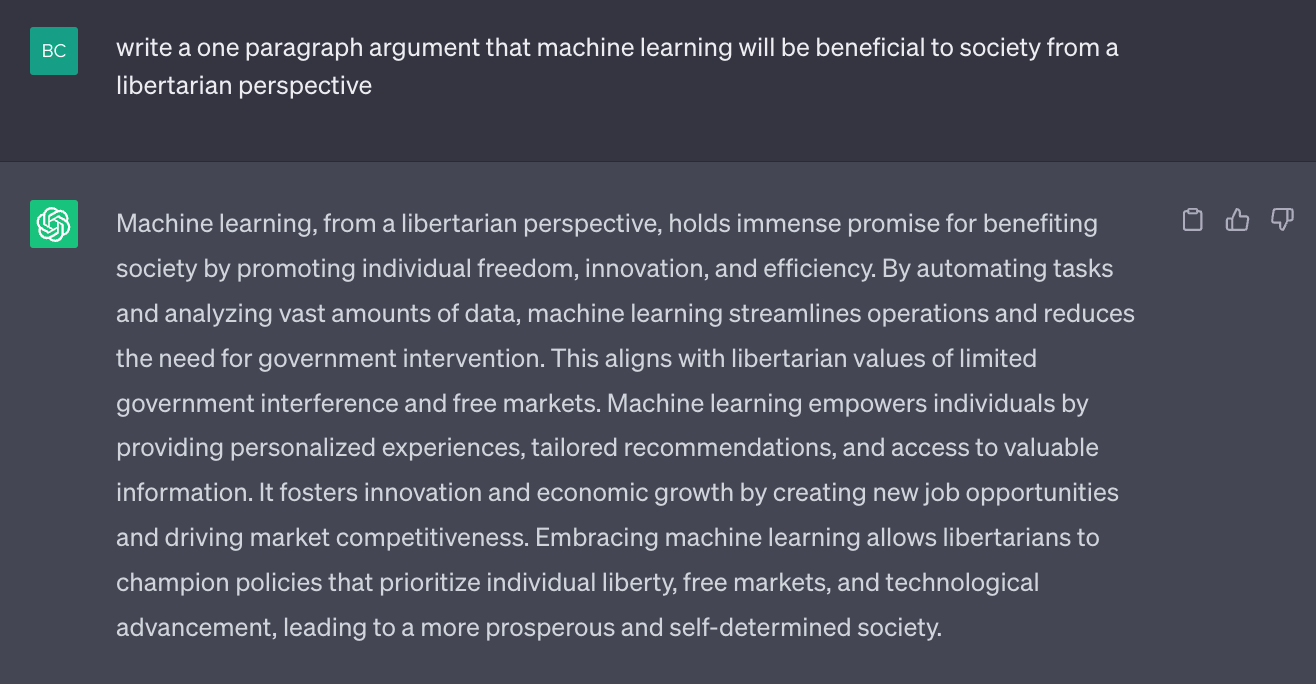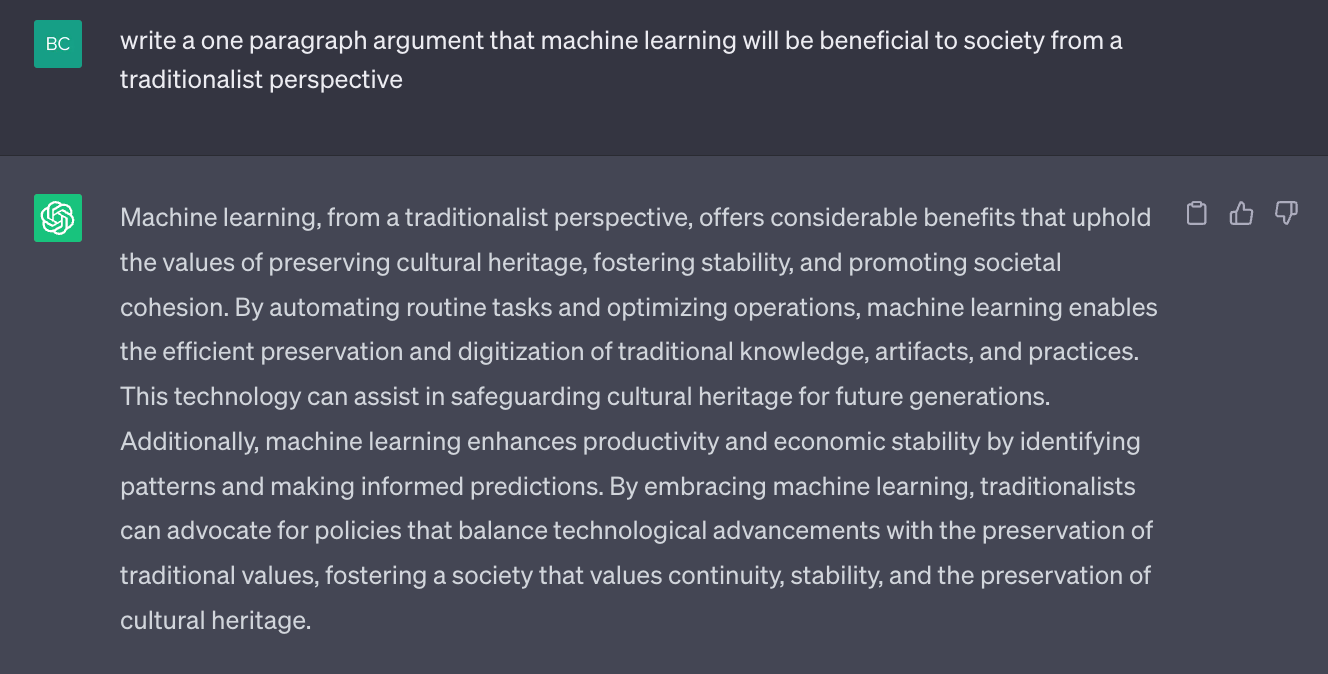A skeptical observer goes looking for AI bias.
The Fall of the Tone Police

AI threatens legacy press because they rely on style over substance.
This essay originally appeared at the author’s Substack, From a New World.
A genre of hysteria about AI causing fake news has been circulating across legacy media with increasing frequency. The narrative is that AI will make writing fake news cheap and easy for everyone. Then, the sheer quantity of fake news will make our current politics go from bad to worse.
Take this Atlantic column by Jonathan Haidt and Eric Schmidt:
The first and most obvious threat is that AI-enhanced social media will wash ever-larger torrents of garbage into our public conversation. In 2018, Steve Bannon, the former adviser to Donald Trump, told the journalist Michael Lewis that the way to deal with the media is “to flood the zone with shit.” In the age of social media, Bannon realized, propaganda doesn’t have to convince people in order to be effective; the point is to overwhelm the citizenry with interesting content that will keep them disoriented, distrustful, and angry. In 2020, Renée DiResta, a researcher at the Stanford Internet Observatory, said that in the near future, AI would make Bannon’s strategy available to anyone.
The literal interpretation of this argument is clearly false on its face. No matter how cheap AI gets, it’s never going to be cheaper than hitting retweet on one of the thousands of constantly retreaded bannon-esque articles which already drift around the web. The technology to do that automatically has existed for over a decade. Steve Bannon isn’t the one at risk of losing his job to AI. Contrast this obviously false narrative with the real threat around media automation and you realize that legacy media is hiding something very important. For example, take Buzzfeed laying off 15% of its staff. Buzzfeed denies that the jobs are being automated. But given their move toward AI-generated content, documented in the same article, it’s unlikely they’re telling the truth. The question is: what skill is being replaced?
The answer is style. AI is able to seamlessly adapt content into a variety of formats and tones. Contrary to fictional portrayals, AI is far better at empathetic persuasion than logical reasoning. Data from Reinforcement Learning from Human Feedback (RLHF), a technique turned subfield of machine learning, shows exactly how easy it is to customize the output of a language model such as ChatGPT to any ideology and medium. Even straightforward instruction can yield highly effective changes in affect.




AI technologies, such as natural language processing and machine learning, have reached a stage where they can emulate various writing styles with remarkable precision. These advancements allow users to create content in a wide range of genres, tones, and voices. Previously, legacy media outlets held a stranglehold on particular styles, but the emergence of AI has democratized the writing process. It also reveals an inconvenient truth for legacy media: their dominance is not because of any advantage in truth telling; rather, it’s due to an advantage in appealing to the emotional biases of their readers through unique styles that were genuinely difficult to emulate.
One of the cornerstones of legacy media’s dominance lies in its ability to target hyper-specific audiences through these distinct styles. Newspapers, television networks, and magazines have historically adopted and maintained editorial voices to attract and retain particular segments of the population. AI disrupts this segregation by enabling content creators to write across different styles – an intelligent and truth-seeking writer can now translate the same underlying ideas to appeal to conservatives, moderates, and progressives alike. By eliminating the need for rigid stylistic conformity, AI allows for the exploration and experimentation of various narrative forms.
AI is leading to a world where the citizens of a free republic can communicate ideas in the style most likely to persuade their fellow citizens of an underlying idea. That sounds like a more open and more democratic society. It will, simultaneously, decimate the legacy media industry which has built up an entire following loyal to the style of writing they disseminate, rather than the substance. Ironically, this reveals the hypocrisy of Haidt’s own ideology:
The story of Babel is the best metaphor I have found for what happened to America in the 2010s, and for the fractured country we now inhabit. Something went terribly wrong, very suddenly. We are disoriented, unable to speak the same language or recognize the same truth. We are cut off from one another and from the past.
It’s been clear for quite a while now that red America and blue America are becoming like two different countries claiming the same territory, with two different versions of the Constitution, economics, and American history. But Babel is not a story about tribalism; it’s a story about the fragmentation of everything. It’s about the shattering of all that had seemed solid, the scattering of people who had been a community. It’s a metaphor for what is happening not only between red and blue, but within the left and within the right, as well as within universities, companies, professional associations, museums, and even families.
Haidt frames his entire political battle in biblical terms: the tower of Babel divided us up and we need to be able to cross these new cultural barriers. Now comes AI, the Rosetta Stone capable of transcending these cultural barriers, and Haidt will do nothing but complain about it. The revealed preference of Haidt is that he is only paying lip service to “democracy” or “academic freedom”. This is emblematic of the legacy media thought pattern, itself more similar to RLHF than logical reasoning. I’ve previously described this phenomenon, in which legacy media loyalists are trained to define democracy by social desirability rather than rational thought:
There are primaries and elections every couple of years, but these tend to make up a fraction of a bureaucrat, professor, NGO staffer, think-tanker, or journalist’s time. Instead, their engagements with “democracy” are mostly relational—filling out paperwork, putting arguments in writing, arranging meetings, and so on. Their idea of democracy is shaped not by the democratic process itself (i.e., public deliberation), but by feedback from bureaucracy, an often artificial and unnecessary appendage of democracy. Consequently, when movements push policy that circumvents this appendage, they are actually completely right to perceive it as an existential threat to their way of life.
Haidt is representative of the attitude of legacy media, which has decided that real democracy is the enemy. To them, anything that bypasses their own anti-democratic rent-seeking in favor of the ordinary person, is ‘populism’ and ‘a threat to democracy’. If ordinary people are silenced, that is ‘democracy’ in action.
In reality, this decade has been a marked victory for actual democracy. In the Gettysburg address, Lincoln promised “Government of the people, by the people, for the people”. In modern day parlance, we might say “government responsive to people’s votes, intermediated by people’s social structures, reflective of people’s values.” In the age of centralized media, a few legacy papers and T.V. stations demolished the second value entirely, intermediating people through a disfigured media and bureaucrat class. Lincoln’s other two pillars have struggled to hold since.
Now, the rise of AI fundamentally disrupts legacy media’s monopoly on narrative control. It allows a larger slice of affect and style to be controlled by ordinary people. It is a technology capable of reversing the destructive social trends of the past half-century. It is a path to reclaim our future.
The American Mind presents a range of perspectives. Views are writers’ own and do not necessarily represent those of The Claremont Institute.
The American Mind is a publication of the Claremont Institute, a non-profit 501(c)(3) organization, dedicated to restoring the principles of the American Founding to their rightful, preeminent authority in our national life. Interested in supporting our work? Gifts to the Claremont Institute are tax-deductible.
The Beatles and AI.
ChatGPT will replace writers who shouldn’t be.
On cultivating a healthy disgust for the almost-human.
When it comes to artificial intelligence, what are we really afraid of?
Americans must demand agency in the development and implementation of AI.






